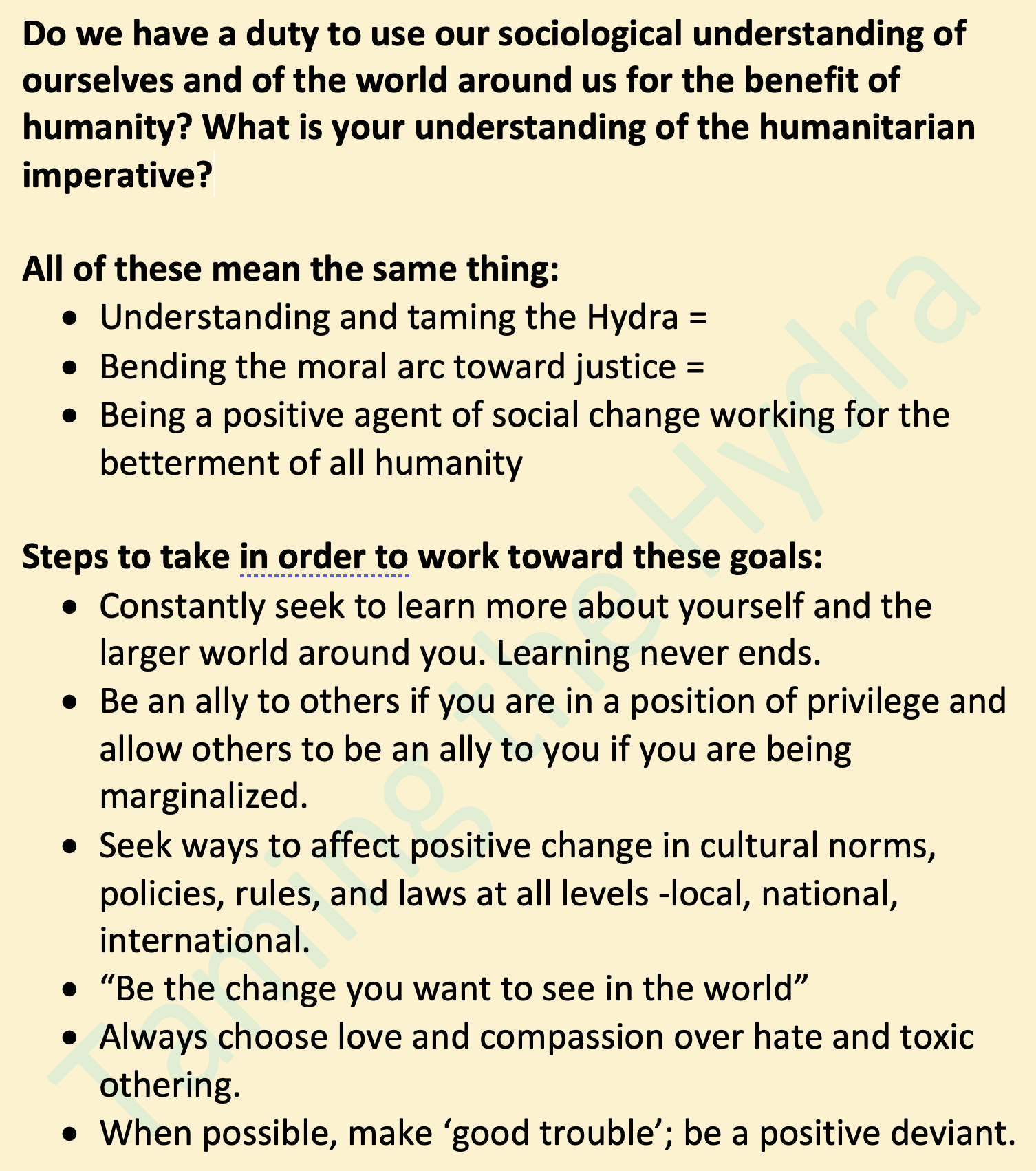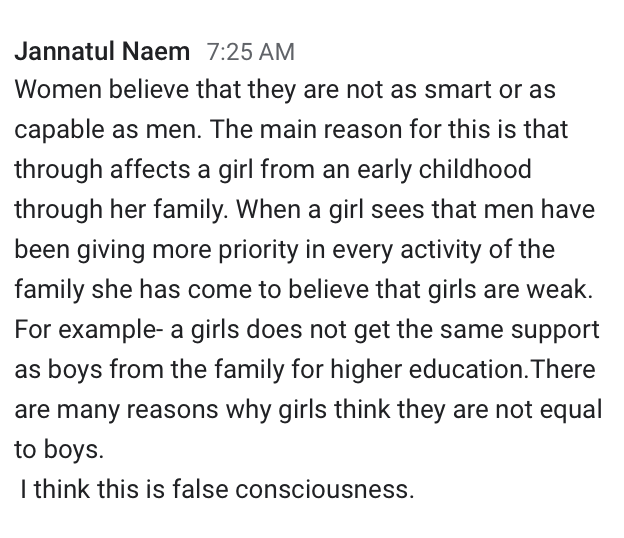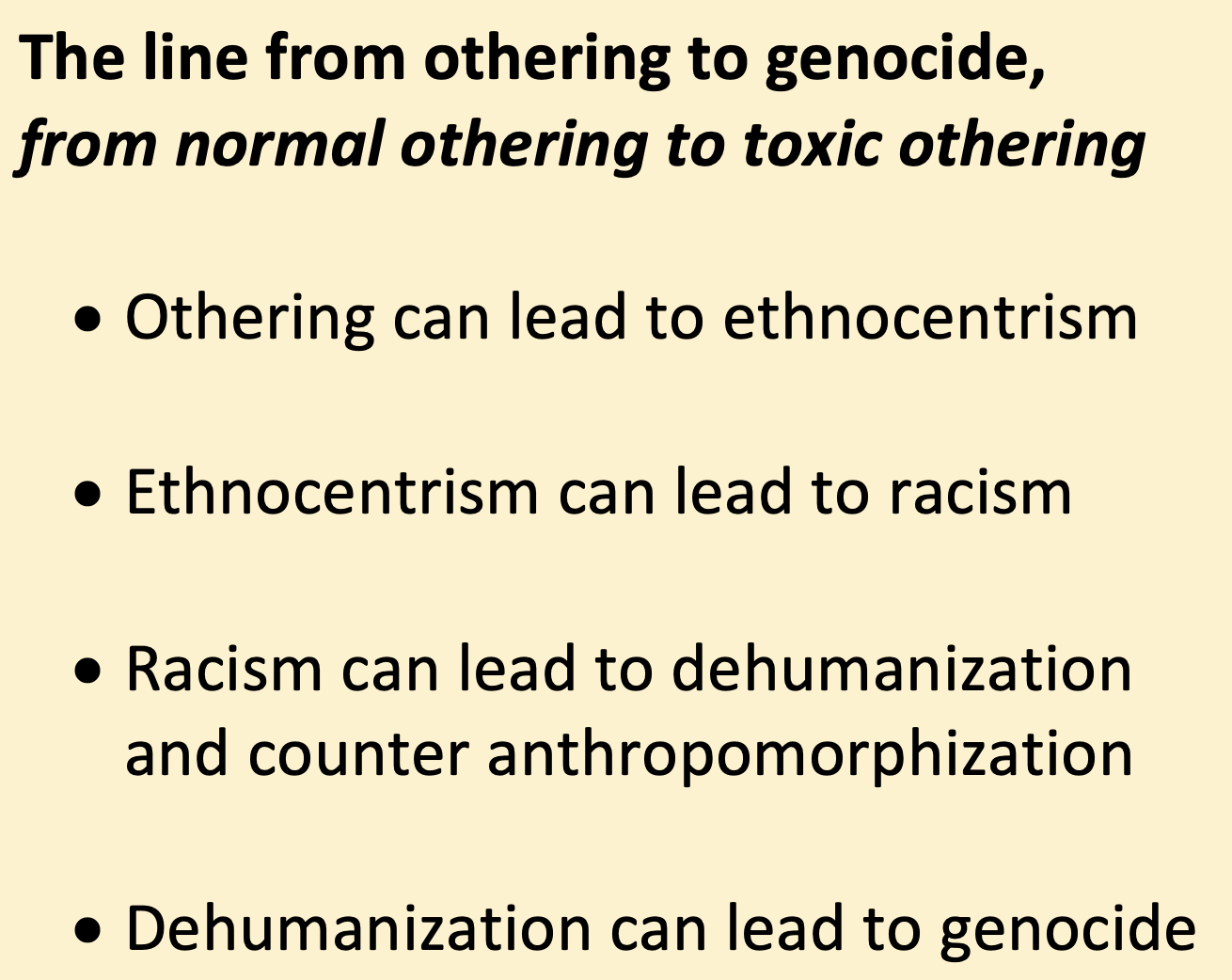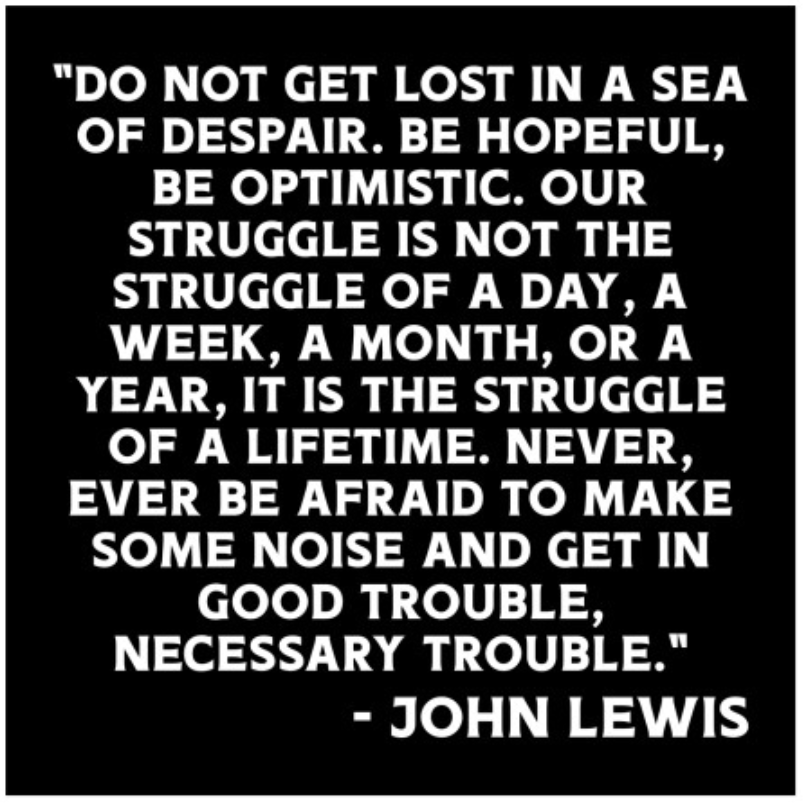Talking with Rohingya and Bangladeshi learners about taming the Hydra
“The educator has the duty of not being neutral.”
-Paulo Freire
Taming the Hydra
My experience teaching sociology to Rohingya and Bangladeshi has been deeply rewarding. Introducing the ideas of culturally embedded privileging forces, ascribed statuses, toxic othering, and the image of the Hydra as a way to understand the common sources of various systemic affronts to human dignity has been an amazing and profound experience.
In our final class as we talked about taming the Hydra and false consciousness the learners offered many useful questions, comments, and examples. When we started this journey together several months ago I had no expectation that given the language difficulties we would ever advance this far. That our last class was so engaging is a testament to my colleague Azizul’s ability as a translator and critical thinker and even more so to the deep thirst for knowledge and insight shown by each class member.
The handout we used began with what by now the learners understood to be a rhetorical question, ‘Do we have a duty to use our sociological understanding of ourselves and the world around us for the benefit of humanity?’ Throughout our class and in my writing I have used interchangeably the phrases ‘taming the Hydra’ and ‘bending the moral arc toward justice’, equating them both with the idea that as humanitarians we should be positive agents of social change.
I never explicitly covered the concept of intersectionality with reference to the eight heads of the Hydra in our class. Perhaps in an advanced class I can begin to probe the many possible combinations of marginalized statuses, and how one can -and often is- both in a position of being marginalized and in a status-superior position. That said, I got a clear sense from the males learners they understood that though some were victims of paternalism/colonization while at the same time in a male dominated culture which systematically marginalizes females. Through this and other discussions both Azizul and I sensed that the learners intuitively understood the basic idea of intersectionality, that one’s array of statuses are interrelated and have powerful additive and multiplicative connections deeply impacting their life chances. Here is what one Rohingya learner said,
“Hydra has many facets or aspects, especially difficult or intractable ones. I feel many deep complicated challenges … and difficulties to tame hydra. Privileging forces are all interconnected. In some time, it can in turn create a great amount of toxic synergy. Likewise there are some hydra headed people who dominant many groups to support his acts and interconnected between them close. If we take action and destroy one head, the rest are come up energetically to harm more because they are interconnected.”
Working to reverse false consciousness
We reviewed the argument that all of the heads of the Hydra are powered by the process of toxic othering and that led to introducing the concept of false consciousness. This idea was originated by Karl Marx and has been primarily used to describe classism in action. Other sociologists use the concept in various more broad contexts and in very powerful ways. In my classes I have used the phrase ‘socialization for disadvantage’ to describe how false consciousness develops among various groups, most specifically females. False consciousness is the idea that those who are marginalized, those who are ascribed a lesser status by society, can come to believe that this lower status is just, proper, reasonable, and inevitable. They believe that they are inferior to the group that defines them as being inferior, i.e., they show a lack of an objective awareness of one’s own potentials and abilities.

For example, women believe that they are inferior to men and believe that they are not as smart or as capable as men. Why would they believe that? If all of the agents of socialization (family, peers, religion, media, education) either directly or indirectly are telling young girls that they are inferior they will tend to be believe this culturally perpetuated untruth. False consciousness can be addressed and reversed by education, awareness, and by support from allies, support from, in this example, men treating women as equals.
When a woman alone sees herself as inferior it’s hard for her to act. But when she talks with other women and finds out that many feel the same, that women are being defined as inferior but really are not, when they begin to realize that they have some allies among men, their false consciousness can transition into class consciousness. When this begins to happen, when women in general believe that, yes we are equal, then they begin to move for cultural changes that insure there are norms, laws, and policies that treat women on a more equal basis. Cross culturally we know that many forms of false consciousness exist relative to all of the privileging forces, but they can be reversed and turned into class consciousness through awareness, education, and critical thinking.
Each of the heads of the Hydra, each of the privileging forces encourages various levels of ‘false consciousness’. Marginalized class, gender, and race/ethnicity and religious statuses are more obvious, but clearly the same phenomena happens with all of the other heads. Here are several examples.
- Paternalism, where the colonized feel inferior to those who ‘gave’ them their freedom, is being addressed broadly by many and very intensely in the humanitarian sector where ‘decolonize aid’ has become much more than a hashtag. This movement shows significant synergy with the global #BLM movement and stresses the intersectionality of race and class.
- Non-hetero/cis individuals in many (most?) cultures have historically been forced to hide their identities, their cultures socializing them to believe that they are not normal, defective, and morally sick. Forward movement on LGTBQI issues is uneven throughout the globe, with many in the majority world (Global South) suffering persecution and stigmatization.
- Differently abled persons -physically, cognitively, and emotionally- continue to be marginalized globally, but in this specific case there is both consciousness raising among those impacted by ableism and by the strong and increasingly vocal array of allies, many of them family members.
- Dire news about the climate crisis from respected experts has begun to address our species hubris, directly questioning the assumption that humans are superior to all other life forms and as such have the right to use and abuse the resources of the planet solely for our benefit.
Those that perpetuate false consciousness of any kind fuel the Hydra. Ethnocentrism can lead to racism and racism frequently, though perhaps not always, can lead to dehumanization and counter anthropomorphization. i.e., taking

away the human qualities of some racial, religious, or ethnic group. When you dehumanize another group, when you take away their humanity it is as if you are just killing an animal or sub-human entity. Dehumanization can lead to the justification of genocide.
The Hydra model demands that we also include all other marginalized statuses (e.g., gender) in this logic; toxic othering of any kind can lead to dehumanization and even to genocide.
I will continue to argue that using the Hydra is an effective way to understand the history of the world in terms of all of the marginalizing and privileging forces which create inequalities between groups. All of this toxic othering can spiral down into dehumanization and to genocide or at least into forms of subjugation and slavery. When you combine toxic othering with the concept of false consciousness this creates a situation where the people that are marginalized don’t fight back because they believe that it is just that they are being marginalized. Taming the Hydra means understanding the need to educate people, facilitating the transition from false consciousness -believing that what is happening to them is right and just- to class consciousness where they reject dehumanization and marginalization. Often this means questioning many long held cultural norms and practices.
Bending the moral arc toward justice means understanding and recognizing how toxic othering has been woven into our cultures, norms, policies, and laws all through history and then finding ways to shine light on these embedded injustices, finding ways to alter these norms laws and policies in such a way that they transition from toxic othering to normal othering. ‘Normal othering’ can be benign; diversity is good, natural, and productive for all human life. We need to find ways to organize social life on this planet such that only normal othering happens. When this state of affairs exists we have tamed the Hydra.
Ascribed status and false consciousness
Every introduction to sociology text published in the last 50 years has a section defining ascribed and achieved statuses. Ascribed statuses are typically defined as those which are given to try at birth, with examples including race, ethnicity, and gender, among others. Simple, right? But looking through the lens of critical Hydra theory the fact that ‘ascribe’ is a verb and infers a subject, as in ‘she ascribed John’s bad mood to his upset stomach.’ This raises a critically important question, namely when a sociologist says a status is ascribed who is the subject of this verb? Who says this person is ‘Black’ or ‘white’, ‘male’ or female’ (etc.). The answer is that the culture does, tradition and ‘common sense’ does. But in our quest to lay bare the privileging forces, all based on the ascribed statues, we must entertain the idea that those in power throughout past history, collectively and individually, have done the ascribing motivated by a desire to create or maintain a status quo which reinforced the toxic othering that is keeping them in a position of ‘superiority.’ False consciousness is buying into the assumption that ones ascribed statues and permanent, immutable, and ‘natural.’ Rejecting false consciousness and taming the Hydra mean questioning all of our ascribed statuses and rejecting the culturally embedded marginalization and normalized that come with these statuses.
Our class discussed how the Rohingya in Cox’s Bazar have the ascribed status ‘refugee’, and how the UNHCR (United Nations High Commission on Refuges) officially certified them as such. Indeed most of the global community accepts this act of labelling. But is embracing this devalued social status an act of false consciousness? I have no glib answer to that question, but I am certain that is a useful question to pose to myself and, more to the point, for the ‘refugees’ themselves to pose to themselves.
‘Good trouble’ and emergent norms
The concept of culture is perhaps the most important of all the social science terms. Unfortunately, many understand culture as something fixed and external to the individual, as a blueprint for living most of us follow most of the time. This model of culture is demonstratively wrong, and most sociologists and anthropologists understand culture to be organic, ever changing and adapting. As anthropologist Miles Richardson put it long ago culture is creativity, it is what we as humans do everyday. We create culture and, as such, are able to enact social change.
One way this can happen is through changing one’s behavior and creating new norms. Many emergent norms  disappear quickly in a culture (think fashion trends that come and go), but those new norms which resonate with others and, I believe, which reflect fundamental human values, can catch on, spreading like a virus from one mind to another and modifying the collective behavior of masses of people.
disappear quickly in a culture (think fashion trends that come and go), but those new norms which resonate with others and, I believe, which reflect fundamental human values, can catch on, spreading like a virus from one mind to another and modifying the collective behavior of masses of people.
‘Be the change you want to see in the world;’ can, cynically, be seen as just another vacuous phrase, but I beg to differ. The late Congressperson John Lewis urged us to cause ‘good trouble’, i.e., being positive deviants acting in ways that confront all forms of exploitation. In line with taming the Hydra he urged us to,
“Continue to build union between movements stretching across the globe because we must put away our willingness to profit from the exploitation of others.”
Given the intersectionality of the privileging forces represented in the Hydra model ‘building union between movements’ indeed must be our constant goal.
Positive deviants
At first he Rohingya and Bangladeshi learners had trouble with the phrase ‘positive deviance’ but through Azizul’s adept translation skills most finally understood that being a leader in the community and a positive agent of social change means sticking out of the crowd, deviating from the cultural norms that marginalize others. Creating and supporting emergent norms that question embedded marginalizing forces is the job of a humanitarian leader.
Bending the moral arc toward justice and taming the Hydra depends on an infinite number of small acts on each of our parts all geared toward changing social norms, policies in our personal lives, organizations with which we work, in our communities, and in laws at the local, national, and international levels. We need to raise our voices not just as informal agents of social control and social change, but consistently urge those who are formal agents of social change, our politicians and thought leaders in organizations and businesses, to accept and fight for change. We need to urge all of these individuals through our phone calls, texts, emails, and one-on-one conversations to change each and every policy and law which contributes to toxic othering. This path is difficult because some of our cultures and even our laws have demonized and marginalized some statuses. Making ‘good trouble’ is going to be difficult for many.
The way forward is not easy; the forces that want to bend the moral arc in a negative direction are strong, and they are represented in some of the leadership we have around the world right now. Look at what’s happening in Ethiopia. Look at what is happening in Myanmar. Look at what is happening in Palestine. Look what is happening in the United States. There are many who fight this anti toxic othering work because they personally benefit, or they are motivated by hatred and fear, driven by some base impulses, namely got gluttony and greed.
Some changes will be harder than others. Hetero/cisnormativity is a problem, and the acceptance of different sexualities and gender identifications is something that flies in the face of much cultural learning for many people around the world. I understand that hill is a very steep one for many people. Similarly, because race, ethnicity, religion, and politics are so inextricably combined in so many cultures it will be difficult for some to accept all humans as deserving of equality and dignity. Perhaps the biggest issue regarding toxic othering is the issue related to anthropocentrism. We tend to see ourselves as, of course, dominant over nature, and this relationship is clearly one which is toxic both metaphorically and literally.
Taming the Hydra means slowing reconstructing our cultures, purging those norms and structures which perpetuate toxic othering. Change will be difficult and must be done in a measured and sober fashion, always motivated by love and compassion.
A beginning
Our team has now completed the Introduction to Sociology training course for this small group of Rohingya and Bangladeshi learners, and recently we had a ‘graduation’ ceremony. I will be following up with these individuals over to see the lasting value of our class, but at this moment I am confident that this new team of ‘Hydra tamers’ will cause good trouble in the refugee camps and in their local communities. There is much to learn from each other and from applying critical Hydra theory to all of the questions we raised during our months together. In my final comments to the learners I charged them to use the conceptual tools they gained through this course -most prominently the Hydra model- to be leaders in their communities and agents of positive social change. This same charge goes to any who read this book.
Post script
A very special guest at our certificate award ceremony was the Executive Director of the Centre for Peace and Justice at Brac University, the honorable Manzoor Hasan. He addressed the learners, congratulating them on their achievement. In his comments he observed that the way we had conducted the class reflected these words from Paulo Freire “The educator has the duty of not being neutral.” Indeed, our conversations about such topics as gender based violence and the oppression of various marginalized groups was anything but neutral.
“The educator has the duty of not being neutral.” Indeed, our conversations about such topics as gender based violence and the oppression of various marginalized groups was anything but neutral.
This particular quotation comes from the book We Make the Road by Walking: Conversations on Education and Social Change, but Freire is most known for his book Pedagogy of the Oppressed. In that book he states,
“…the fact that certain members of the oppressor class join the oppressed in their struggle for liberation, thus moving from one pole of the contradiction to the other… Theirs is a fundamental role, and has been throughout the history of this struggle. It happens, however, that as they cease to be exploiters or indifferent spectators or simply the heirs of exploitation and move to the side of the exploited, they almost always bring with them the marks of their origin: their prejudices and their deformations, which include a lack of confidence in the people’s ability to think, to want, and to know. Accordingly, these adherents to the people’s cause constantly run the risk of falling into a type of generosity as malefic as that of the oppressors. The generosity of the oppressors is nourished by an unjust order, which must be maintained in order to justify that generosity. Our converts, on the other hand, truly desire to transform the unjust order; but because of their background they believe that they must be the executors of the transformation. They talk about the people, but they do not trust them; and trusting the people is the indispensable precondition for revolutionary change. A real humanist can be identified more by his trust in the people, which engages him in their struggle, than by a thousand actions in their favor without that trust.”
I was humbled to have my name uttered in the same sentence as Paolo Freire, and it gave me pause. Reflecting now about my experience I can say full throatily that I trusted absolutely my colleague Azizul from the very beginning of our relationship many months ago. Over the weeks of our class I grew to not only trust but to be challenged by the learners in our class. Though I do come from the ‘oppressor class’ I have worked hard to continually identify and address the ‘marks of my origin’ and now see my liberation bound up in the fight for the liberation of all humans. I do believe that a true humanist must trust those with which they partner but also must trust -and walk forward with- humanity as a whole.


 Follow
Follow